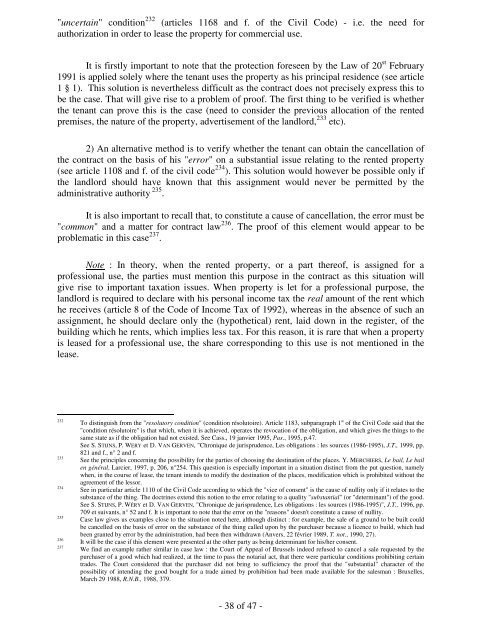- 1 of 47 - BELGIUM Catherine DELFORGE and Ludivine ...
- 1 of 47 - BELGIUM Catherine DELFORGE and Ludivine ...
- 1 of 47 - BELGIUM Catherine DELFORGE and Ludivine ...
You also want an ePaper? Increase the reach of your titles
YUMPU automatically turns print PDFs into web optimized ePapers that Google loves.
"uncertain" condition 232 (articles 1168 <strong>and</strong> f. <strong>of</strong> the Civil Code) - i.e. the need for<br />
authorization in order to lease the property for commercial use.<br />
It is firstly important to note that the protection foreseen by the Law <strong>of</strong> 20 st February<br />
1991 is applied solely where the tenant uses the property as his principal residence (see article<br />
1 § 1). This solution is nevertheless difficult as the contract does not precisely express this to<br />
be the case. That will give rise to a problem <strong>of</strong> pro<strong>of</strong>. The first thing to be verified is whether<br />
the tenant can prove this is the case (need to consider the previous allocation <strong>of</strong> the rented<br />
premises, the nature <strong>of</strong> the property, advertisement <strong>of</strong> the l<strong>and</strong>lord, 233 etc).<br />
2) An alternative method is to verify whether the tenant can obtain the cancellation <strong>of</strong><br />
the contract on the basis <strong>of</strong> his "error" on a substantial issue relating to the rented property<br />
(see article 1108 <strong>and</strong> f. <strong>of</strong> the civil code 234 ). This solution would however be possible only if<br />
the l<strong>and</strong>lord should have known that this assignment would never be permitted by the<br />
administrative authority 235 .<br />
It is also important to recall that, to constitute a cause <strong>of</strong> cancellation, the error must be<br />
"common" <strong>and</strong> a matter for contract law 236 . The pro<strong>of</strong> <strong>of</strong> this element would appear to be<br />
problematic in this case 237 .<br />
Note : In theory, when the rented property, or a part there<strong>of</strong>, is assigned for a<br />
pr<strong>of</strong>essional use, the parties must mention this purpose in the contract as this situation will<br />
give rise to important taxation issues. When property is let for a pr<strong>of</strong>essional purpose, the<br />
l<strong>and</strong>lord is required to declare with his personal income tax the real amount <strong>of</strong> the rent which<br />
he receives (article 8 <strong>of</strong> the Code <strong>of</strong> Income Tax <strong>of</strong> 1992), whereas in the absence <strong>of</strong> such an<br />
assignment, he should declare only the (hypothetical) rent, laid down in the register, <strong>of</strong> the<br />
building which he rents, which implies less tax. For this reason, it is rare that when a property<br />
is leased for a pr<strong>of</strong>essional use, the share corresponding to this use is not mentioned in the<br />
lease.<br />
232 To distinguish from the "resolutory condition" (condition résolutoire). Article 1183, subparagraph 1 st <strong>of</strong> the Civil Code said that the<br />
"condition résolutoire" is that which, when it is achieved, operates the revocation <strong>of</strong> the obligation, <strong>and</strong> which gives the things to the<br />
same state as if the obligation had not existed. See Cass., 19 janvier 1995, Pas., 1995, p.<strong>47</strong>.<br />
See S. STIJNS, P. WERY et D. VAN GERVEN, "Chronique de jurisprudence, Les obligations : les sources (1986-1995), J.T., 1999, pp.<br />
821 <strong>and</strong> f., n° 2 <strong>and</strong> f.<br />
233 See the principles concerning the possibility for the parties <strong>of</strong> choosing the destination <strong>of</strong> the places. Y. MERCHIERS, Le bail, Le bail<br />
en général, Larcier, 1997, p. 206, n°254. This question is especially important in a situation distinct from the put question, namely<br />
when, in the course <strong>of</strong> lease, the tenant intends to modify the destination <strong>of</strong> the places, modification which is prohibited without the<br />
agreement <strong>of</strong> the lessor.<br />
234 See in particular article 1110 <strong>of</strong> the Civil Code according to which the "vice <strong>of</strong> consent" is the cause <strong>of</strong> nullity only if it relates to the<br />
substance <strong>of</strong> the thing. The doctrines extend this notion to the error relating to a quality "substantial" (or "determinant") <strong>of</strong> the good.<br />
See S. STIJNS, P. WÉRY et D. VAN GERVEN, "Chronique de jurisprudence, Les obligations : les sources (1986-1995)", J.T., 1996, pp.<br />
709 et suivants, n° 52 <strong>and</strong> f. It is important to note that the error on the "reasons" doesn't constitute a cause <strong>of</strong> nullity.<br />
235 Case law gives us examples close to the situation noted here, although distinct : for example, the sale <strong>of</strong> a ground to be built could<br />
be cancelled on the basis <strong>of</strong> error on the substance <strong>of</strong> the thing called upon by the purchaser because a licence to build, which had<br />
been granted by error by the administration, had been then withdrawn (Anvers, 22 février 1989, T. not., 1990, 27).<br />
236 It will be the case if this element were presented at the other party as being determinant for his/her consent.<br />
237 We find an example rather similar in case law : the Court <strong>of</strong> Appeal <strong>of</strong> Brussels indeed refused to cancel a sale requested by the<br />
purchaser <strong>of</strong> a good which had realized, at the time to pass the notarial act, that there were particular conditions prohibiting certain<br />
trades. The Court considered that the purchaser did not bring to sufficiency the pro<strong>of</strong> that the "substantial" character <strong>of</strong> the<br />
possibility <strong>of</strong> intending the good bought for a trade aimed by prohibition had been made available for the salesman : Bruxelles,<br />
March 29 1988, R.N.B., 1988, 379.<br />
- 38 <strong>of</strong> <strong>47</strong> -

















